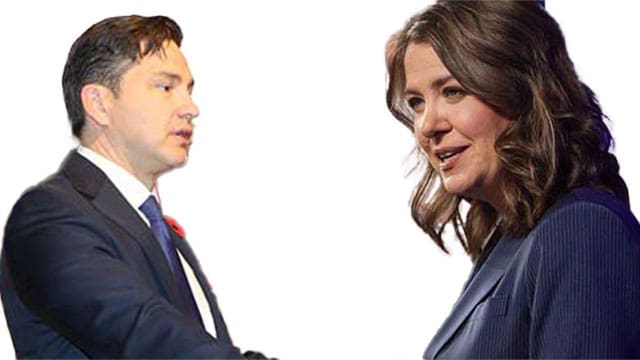Danielle Smith and Pierre Poilievre share many ideological beliefs. But will that bring peace to Alberta?
 By now, you will have tired of the heap of conflicting opinions on the Alberta government’s latest attempt to draw the federal government into a pissing match. As you should, because – barring a stunning turnaround in the polls – Danielle Smith won’t have Justin Trudeau to kick around after the next federal election, expected in the fall of 2025.
By now, you will have tired of the heap of conflicting opinions on the Alberta government’s latest attempt to draw the federal government into a pissing match. As you should, because – barring a stunning turnaround in the polls – Danielle Smith won’t have Justin Trudeau to kick around after the next federal election, expected in the fall of 2025.
For those who have tuned out, last week’s volley was Smith’s announced plan to forbid Alberta’s cities from cutting funding deals directly with the federal government.
What, one wonders, will a premier who has built her electoral success on cynical shadow-boxing with an ideologically distant federal party do to hold voter interest? More importantly, will the relationship between Alberta’s premier and prime minister-in-waiting Pierre Poilievre be all that chummy?
The short answer is that things will certainly be smoother, but not necessarily a love-in.
 Pierry Poilievre and Danielle Smith |
| Related Stories |
| The Alberta government falls short when it comes to risk management
|
| A blueprint for rural energy innovation in Alberta
|
| Nenshi jumps into the Alberta NDP leadership race, but don’t count on him becoming Premier
|
There is much the two conservative leaders agree on. Poilievre says he shares Alberta’s concern about “Trudeau’s anti-energy and anti-resource agenda.” He has also spoken out in support of the UCP government’s approach to transgender issues and told Trudeau he should “butt out” of provincial matters. UCP policies will require that Alberta trans kids aged 15 and under get parental consent to use their preferred names and pronouns in school.
Smith’s intention to ban federal-city funding deals also puts Poilievre in a tricky position. He has proposed a suite of measures to speed up housing construction, including offering bonuses to municipalities that build more housing – and threatening to withhold money from those that don’t. Smith said she will only support Poilievre’s initiative if the province is invited to the table: “I would say that as long as he’s working through the provincial government, we’re not going to have any problem with that.”
Yet there have been moments when the two leaders stand in stark opposition. Last fall, Poilievre came out firmly against Smith’s campaign to withdraw the province from the Canada Pension Plan (a campaign that has since been stuck in idle by a wall of public opposition).
“I encourage Albertans to stay in the CPP,” Poilievre declared, although he tried to sugarcoat the bitter medicine for Smith by saying he understands why the Alberta government is so set on distancing itself from just about anything the federal government does.
“We would not be having this CPP debate if I were today prime minister because Alberta would be free from carbon taxes, unconstitutional anti-energy laws, and other unfair wealth transfers,” Poilievre declared.
Previously, he has said provinces will not have to resort to legislation like Alberta’s sovereignty act “because I am going to respect provincial jurisdiction.” The Alberta Sovereignty Within a United Canada Act aims to give the province’s cabinet the power to rewrite laws and order government agencies, police, cities and universities to disregard federal legislation that the Alberta government deems unconstitutional or harmful to the province.
Smith has also run into choppy water over the actions of her political allies. In February, for example, Take Back Alberta (TBA) leader David Parker went on X to accuse Poilievre of infidelity. Smith had to scramble, calling Parker’s tweet “inappropriate and hurtful” and urging him to “get some help.”
This is mighty awkward for Smith, however, because the social conservatives in TBA helped her win the leadership and the election. TBA affiliates comprise at least half the board of Alberta’s governing United Conservative Party.
Still, these little aggravations can likely be patched over because Smith and Poilievre will be starting from a position of trust. Ideologically, they are practically twins, and the power of that philosophical alliance cannot be overstated.
Yet, as the disagreement over the pension plan shows, the future prime minister’s priorities will sometimes be at odds with Smith’s. Inspired by ideas in the Calgary School’s Firewall Letter of 2001, Smith is essentially trying to turn Alberta into Quebec West. Having a second problem child is not something a national leader of any political stripe would love.
To get elected, Poilievre needs to build a coalition that will draw disaffected voters from the “mushy middle” away from the Liberals and over to his camp. That means he has to appeal to the small-c conservatives of Ontario who get as antsy about a radical right agenda as they do about the left. And that means he will have to support a credible carbon-reduction strategy, even if doing so impacts Alberta’s economy.
He also has to find a way to build support in Quebec, which brings with it a whole new set of compromises.
Nope. A love-in between Smith and Poilievre is not in the cards. You’re more likely to see something akin to squabbling siblings. Let’s hope the goodwill they carry for each other will be enough to end the petty backbiting that today threatens our Confederation.
Doug Firby is an award-winning editorial writer with over four decades of experience working for newspapers, magazines and online publications in Ontario and western Canada. Previously, he served as Editorial Page Editor at the Calgary Herald.
For interview requests, click here.
The opinions expressed by our columnists and contributors are theirs alone and do not inherently or expressly reflect the views of our publication.
© Troy Media
Troy Media is an editorial content provider to media outlets and its own hosted community news outlets across Canada.

